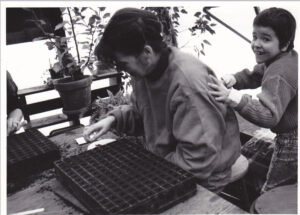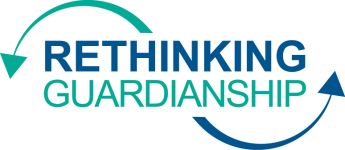Maureen’s Story
 “When I was told that I should petition for guardianship, the first thing I thought of was ‘Guardian Angel’ – someone to protect you and guide you. It had no negative connotation attached to it.”
“When I was told that I should petition for guardianship, the first thing I thought of was ‘Guardian Angel’ – someone to protect you and guide you. It had no negative connotation attached to it.”
And now? “I think guardianship should be used only if someone is comatose. The reality is that many people are not advanced enough as human beings to put someone else’s needs ahead of their own.”
These are the reflections of Maureen, the mother of Lukas, now in his 30’s who has recently moved in with his father after going through a challenging guardianship process and living in group homes for the past two years.
Maureen was born in Brooklyn, NY where she lived for 35 years. A lifelong potter who is currently enrolled in Sociology and Legal Studies at UNC Asheville, she raised her young son and daughter in an intentional community caring for the elderly in upstate New York in the 90’s and 00’s with a Waldorf School and tutoring from caring, retired teachers.
Lukas, a creative and sensitive child who writes poetry to this day, has congenitally malformed ear canals as well as a CMT neuromuscular disorder, (similar to Muscular Dystrophy) which required special medical attention and surgical procedures in his youth.
In adolescence, Lukas’s behavior began to change and there were safety concerns within the family and community. During that time, Lukas displayed symptoms of a possible mental illness. He moved in with his father and at 19 was diagnosed with Schizoid Affective and Bipolar Disorder.
Lukas’ mother, stepfather and father moved to North Carolina when Lukas was 25. Maureen was able to see him more often and Lukas was writing poetry. Over the next two years, he started getting out, doing things, becoming involved in NAMI, (National Alliance on Mental Illness) once making hotdogs at an event and referring to it as “the best day of my life.”
At 30, Lukas had a mental health crisis, and Maureen was told by a social worker “If I were you, I would petition for guardianship so he doesn’t go back to his father.” Maureen asked two other social workers if she should pursue guardianship and they both said yes.
Lukas was in the hospital when his mother petitioned for guardianship. The Asst. Clerk of Court casually told her that her ex-husband would have his day in court if he didn’t agree. When Maureen expressed concern about the permanency of the guardianship, the Asst. Clerk told her it could always be reversed. There was no information given at the Court on guardianship and its responsibilities and consequences.
From a list, the Assistant Clerk assigned Lukas a Guardian ad Litem, (GAL) who visited Lukas while in a psychotic episode in the hospital, unable to speak for himself at the time, but did not interview friends and neighbors to determine “substituted judgment,” (i.e., speak to people who knew him before his psychotic episode to know what he would have wanted) instead meeting with the two parent’s attorneys to determine “best interest,” which resulted in a recommendation to the Clerk that Lukas be assigned a third party guardian.
On the day of Lukas’ guardianship hearing, Lukas’ father, Maureen, and their daughter assembled in the courtroom and the Clerk of Court ruled in favor of a third party guardian. The hearing was not recorded (this is done at the discretion of the Clerk) and Maureen received the 2 page GAL report halfway through the hearing.
Maureen knew going into the courtroom that the assignment of a third party guardian was the likely outcome. However, at the time, she said to herself, “Maybe this will be a good thing – that we will work collaboratively to help Lukas.”
A second hearing included the assigned guardian and Maureen realized that the collaboration she hoped for was not going happen. The guardian would not speak to her after the hearing, eventually giving her thirty minutes to share all she wanted to share about Lukas and his background.
Eventually, Lukas was taken from the hospital and placed in a group home. Maureen was ordered not to contact Lukas and was unable to see him for three months. She was repeatedly told, “Lukas doesn’t want to talk to you.” However, as soon as he was moved to another group home, he had sudden access to his mail and the telephone and they were back in touch with each other.
In the past month, Lukas has moved back in with his father while retaining his third party guardian. Although it is still early, he is fairly stabilized on his medication and Lukas’ mother and father are seeing a counselor on a regular basis to align their vision and support for him.
What are Maureen’s goals and dreams for Lukas? She wants him to find a place to live and be happy and pursue his own dreams of getting a job and finding a girlfriend. She also hopes he will exercise his creativity through poetry and his interest in cooking.
Finally, together with Lukas’ father and stepfather, she envisions a restoration of Lukas’ rights, which wouldn’t be happening without considerable advocacy.
What important change would she make to the guardianship system in North Carolina? “When people go to file a petition, they should be given information, perhaps a brochure, that makes it clear what guardianship is and what alternatives exist. I think there should a 24-hour waiting period time period given to read this information. Guardianship is SO serious and legally binding.”
**Photo – Maureen and Lukas, while living at the intentional community in upstate New York – March 1993

